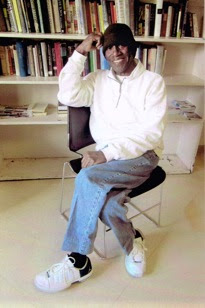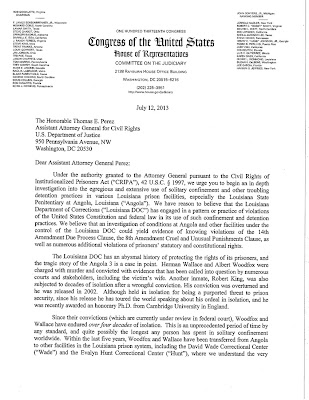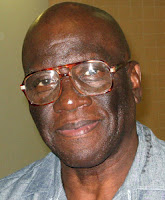READ: Herman Wallace and Nelson Mandela: A Tale of Two Heroes (Ebony Magazine)
Please take Action for Herman Wallace of the Angola 3 by joining Amnesty International’s call to release him on humanitarian grounds! There are action pages for the: USA, United Kingdom, France, Belgium, and everywhere else.
 |
| (Recent photo of Herman: No Shackles!) |
Opening the Box: Sarah Shourd on Herman Wallace, California Hunger Strikers and the Horror of Solitary Confinement
By Angola 3 News
Last month, we were devastated to learn that the Angola 3’s Herman Wallace had been
diagnosed with liver cancer, and that he was continuing to be held in isolation in a locked room at Hunt Correctional Center’s prison infirmary. Reflecting on his confinement while battling cancer, Herman said: “My own body has now become a tool of torture against me.”
On July 10, Amnesty International launched a campaign directed at Louisiana Governor Bobby Jindal, calling for Herman’s immediate release on humanitarian grounds (
take action here). “After decades of cruel conditions and a conviction that continues to be challenged by the courts, he should be released immediately to his family so that he can be cared for humanely during his last months,”
said Amnesty USA campaigner Tessa Murphy.
In recent years, Amnesty has initiated other campaigns challenging the over 41 years spent in solitary confinement by Herman and Albert Woodfox, also of the Angola 3, including the April 17, 2012 delivery of a 67,000 signature petition to LA Governor Jindal demanding Albert and Herman’s immediate release from solitary. Earlier this year, Amnesty called on Louisiana Attorney General James Caldwell to not appeal the US District Court’s overturning of Albert’s conviction. More recently, accompanying their call for Herman’s release, Amnesty also expressed concern about “the worsening conditions of confinement” for Albert at David Wade Correctional Center, where he remains in solitary confinement. “For approximately two months, Woodfox has been subjected to additional punitive measures – including strip searches each time he leaves or enters his cell, being escorted in ankle and wrist restraints, restricted phone access, and non-contact visits through a perforated metal screen. Temperatures in the prison cells are reportedly extremely high, regularly reaching up to 100 degrees Fahrenheit,” wrote Amnesty.
Public outrage intensified on Friday, July 12, when
a letter citing the Angola 3 case, was sent to the Civil Rights Division of the US Justice Department by Congressman John Conyers, Jr. (D-Mich.), Ranking Member of the full U.S. House Judiciary Committee, Congressman Jerrold Nadler (D-N.Y.), Ranking Member of the Subcommittee on the Constitution and Civil Justice, Congressman Robert C. “Bobby” Scott (D-Va.), Ranking Member of the Subcommittee on Crime, Terrorism, Homeland Security, and Investigations, and Congressman Cedric Richmond (D-La.). The letter called for an investigation of the Louisiana Departments of Corrections for its “abysmal history of protecting the rights of its prisoners,” of which the “tragic story of the Angola 3 is a case in point.”
About Herman Wallace, the Congressmen wrote: “We have heard that he lost over 50 pounds within 6 months. Despite that dramatic weight loss, and at 72 years old, the prison did nothing to treat or diagnose him until he was sent to an emergency room on June 14. Given the late stage of his diagnosis, his treatment options are now limited. He is frail and ill, but is still being treated as if he is a threat to security, and we hear that he remains under lockdown conditions. This is unconscionable.”
Within hours of the letter’s release, Herman Wallace was transferred out of solitary confinement, when Louisiana’s Hunt prison reduced his classification from maximum to medium security. Herman is now staying at the prison hospital in a 10-bunk dorm, with access to a day room, and does not have to wear leg irons anymore. While celebrating the more human conditions, Herman and the International Coalition to Free the Angola 3 emphasize that the transfer from solitary is not enough. They are asking folks to continue supporting Amnesty International’s call for humane release. The Angola 3’s
Robert H. King, himself released in 2001 after 29 years in solitary confinement, says, “The wind is at our back and with your continued help our objective will be realized – freedom is in sight.”
The case of the Angola 3 is at the center of
a 42-day fundraising drive begun for a touring play, entitled
Opening the Box, that will focus on the use of prolonged solitary confinement in US prisons. The choice of fundraising for 42 days is a tribute to the almost 42 years spent in solitary by Herman Wallace and Albert Woodfox. The writer and producer of Opening the Box, Sarah Shourd, is
herself a survivor, having spent 410 days in solitary confinement while held as a political hostage by the Iranian Government from 2009-2010. After returning to the US, she successfully fought for the release of her now-husband Shane Bauer and friend Josh Fatal.
Conceived specifically “to add to the momentum of a burgeoning movement” against solitary, Shourd will be working with
Solitary Watch to “collect real stories from a diverse spectrum of people living in solitary confinement today–immigrants, children, lifers and women. Then, I’m going to write a play about it and go on tour.”
“While watching this play, I want the audience to breathe along with a young man having a panic attack after being denied a visit with his mother, to crawl inside the skin of an immigrant detainee terrified of being deported and to travel with a lifer on a magic carpet of memory–only to be pulled back into the stark, implacable reality of the hole. By hearing these stories, my hope is that the audience will be able to relate to the men and women enduring this torture in our prisons, to their pain but also to their resistance to the dehumanizing forces around them, their incredible resilience…and their refusal to be institutionalized,”
explains Shourd.
In this interview, which Shourd dedicates to Herman Wallace, we take a closer look at her project, Opening the Box, as well as the ongoing prisoner hunger strike in California, the Angola 3 case, and the politics of prisons in the US. Currently based in Oakland, California, Shourd is an author and Contributing Editor at Solitary Watch. Before being captured by the Iranian government, Shourd was living in a Palestinian Refugee Camp in Damascus, Syria, working as a journalist and teaching for the Iraqi Student Project. She’s written for The New York Times, CNN, Newsweek’s Daily Beast and has a
blog on Huffington Post. Her memoir (co-authored by Shane Bauer and Josh Fattal) will be published by Houghton Mifflin Harcourt in Spring 2014. To learn more visit
sarahshourd.com and/or follow her on Twiiter @SShourd.
 |
| (PHOTO: Sarah Shourd speaks in support of solitary survivor Bradley Manning) |
Angola 3 News: Why did you choose to spotlight the case of the Angola 3 with 42 days of fundraising?
Sarah Shourd: I only knew a little about the Angola 3 before I was detained in Iran, but I thought about them when I was inside. I also thought about Mumia Abu Jamal, Nelson Mandela, my friend Jafar Saidi (who is being held in a Pennsylvania prison) and all the other prisoners I’d heard of being held in prolonged isolation. I reasoned that if these people found the strength to endure weeks, months or even decades alone, then that meant I could get through it too. Their example helped me believe that it was possible to survive indefinite solitary confinement, that with enough discipline and focus, I could learn to stay afloat, to ward off depression & hopelessness and even confront each day with some sort of dignity and purpose.
Now that I’ve studied Herman and Albert’s case, I know there is absolutely no evidence that either of them is guilty of the crime (murdering a guard) that landed them in solitary 41 years ago. The 70’s were an extremely volatile and politicized time inside Angola prison and prisons around the country. Herman, Albert and Robert were organizing and resisting mistreatment by guards inside Angola—and I believe that’s why they were targeted by prison officials and used to set an example.
Herman and Albert were given a sentence on top of their original sentence—life in solitary confinement. This ruling was made internally, without judge or jury, which in my opinion is unconstitutional.
A3N: Following Herman Wallace’s recent cancer diagnosis and continued isolation, we are mobilizing public support for compassionate release. Can you say something in support of Herman’s medical release?
SS: Herman deserves a release on compassionate, medical grounds more than any other prisoner I’ve ever heard of. It couldn’t be more obvious that he’s no danger to anyone and the yet extent of suffering that’s been heaped upon him over the last four decades is beyond comprehension. No human being, under any circumstances, should be subject to this kind of cruelty.
That said, there’s no changing what’s already been done. The best hope for Herman is that he be allowed to taste freedom and be with his loved ones for the last months or years of his life. After 41 years, Herman deserves much, much more than that—but all we can really hope for is that government officials decide to grant Herman a compassionate, medical release the most expedient way possible. This is the only way to make right even a fraction of the wrong that’s been done— before it’s too late.
SS: I’d been fighting non-stop for over a year when my now-husband Shane Bauer and friend Josh Fatal were finally released from prison in Iran. Just weeks later, the UN’s Special Rapporteur on Torture, Juan Mendez, issued a report condemning the long-term use of isolation on prisoners and calling it torture. Mendez went on to say that any period over 15 days in solitary can cause permanent psychological damage and should be subject to strict, mandatory review.
A few weeks later, the largest hunger strikes in history erupted in my home state, California. It was such an intense, mixed time for me. After more than two years since our initial arrests, the three of us were all finally together, free and back in the US. Yet, I was acutely aware of the tens of thousands of people in my own country, who were needlessly suffering the same kind of torture that the three of us had been subjected to.
I began speaking and writing about solitary confinement, connecting my own experience to what I saw happening around me. I knew the fight for justice wasn’t over for me—this was now a lifelong commitment.
A3N: What do you think of the current hunger strike? Do you support the strike’s criticism of prison authorities’ response to the 2011 strike?
SS: I’m angry that ten of thousands of prisoners have been forced to begin hunger striking again, but they have no other choice. The response from California prison authorities to the demands of the prison hunger strikers in 2011 was sorely inadequate. In fact, no tangible changes have been made at all. Prisoners in our country have next to no rights—they have to risk their health, safety and even their own lives in order to be heard.
I’m impressed, but by no means surprised, by how widespread resistance to solitary confinement has become inside our prisons—with 29,000 people refusing their food on the very first day. I think the renewal of this hunger strike is a sign that prisoners have reached a tipping point. They’ve made their grievances visible, so that now politicians, prison officials and the public can no longer afford to ignore the horrors happening inside our prisons.
A3N: With over 2.4 million prisoners today, the US now has the most total prisoners and the highest incarceration rate in the world. How do you think this unprecedented level of mass incarceration relates to the widespread use of long-term solitary confinement?
SS: Before I spent 410 days in solitary confinement, I knew that isolating a person was a cruel form of punishment. Still, it wasn’t until I experienced it myself that I realized it was torture. Long periods with little to no human contact violates a person’s psyche in the deepest, most insidious way—a way that usually leaves no physical marks but leaves most people psychologically damaged and changed forever
I see solitary confinement as the deep end of our very broken prison system. It’s the worst punishment our system dolls out. It’s also used routinely, often arbitrarily and with little to no oversight.
There are other ways to run prisons that are better for both prisoners’ individual health and public safety. However, instead of trying to deal with serious issues like prison violence (by inmates and guards) constructively, in U.S. we lock ten of thousands of people alone in cages where they lose their minds, often hurt themselves and commit suicide at a much higher rate than in the general prison population.
Still, prison authorities can’t keep them locked up forever. The majority of people that have been subjected to prolonged solitary confinement will one day be released back into society, where little to no services exist to help them recover, reintegrate and move forward in a positive way. That’s why so many ex-prisoners reoffend and the cycle continues.
Our prison system has veered so far from the path of rehabilitation over the last 30 years, there’s hardly even an attempt on behalf of prison authorities to give the impression they’re trying to provide inmates with resources or opportunities to change. Instead, prisoners are treated like raw material instead of human beings, warehoused away like surplus goods.
A3N: Who, in particular gets targeted for solitary and why?
SS: Solitary confinement is a perfect illustration of what our prison system has become. It’s used as a control strategy against anyone who presents any kind of hassle to prison officials and/or needs services that our prison system has neglected to provide. Guards use any excuse to get rid of people by sending them to the ‘hole,’ such as petty drug use, profanity and/or any small, petty (often non-violent) infraction.
The real reason many people wind up in solitary is because they have unpopular or threatening political beliefs, because they’re gay or transgender and need so-called ‘protection,’ because they’ve reported rape or abuse by prison officials and/or simply because they are mentally ill.
Human Rights Watch estimates that one-third to one-half of inmates in isolation had some form of mental illness before they were put there. Using solitary confinement instead of providing mental health and other rehabilitative services is inhumane, not to mention extremely negligent. This practice doesn’t serve society and that’s why we need to hold prison officials accountable and end this practice.
A3N: Looking from an international perspective, how do other countries differ regarding the use of prolonged solitary confinement?
SS: Many countries around the world only use solitary in their prisons as a very last resort. England, for example, tried implementing solitary confinement as a disciplinary measure. When prison violence increased, and they realized how expensive and cruel this practice was, they simply stopped relying on it. Today there are a few dozen prisoners held in prolonged solitary in the UK—compared to our estimated 80,000 on any given day.
The reason this mistake was caught and largely corrected in England was simple—they have a system of oversight in place, a government body that closely monitors what happens inside their prisons and keeps the public informed. In the U.S. we have nothing like this in place. As a result, this practice has gotten out of control and we’ve become by far the largest offender of this inhumane, senseless practice in the world.
A3N: Why is theater a useful medium for telling these stories? How do you foresee this helping to build momentum against the practice of solitary confinement?
SS: I believe a play can reach a new and different segment of the population with a human rights issue that should be of grave concern to everyone in our country. ‘Opening the Box’ also has the potential of humanizing this issue in a visceral, embodied way that an article or report can’t.
In the late 90s a play called The Exonerated—based on true stories of innocent death row survivors— came out and quickly spread like wildfire. Half a million people saw this play and actors like Susan Sarandon & Danny Glover did cameos and the Governor of Illinois was so affected by seeing the play he decided to commute all the existing death row sentences in his state to life in prison.
I believe that hearing, seeing and reading real, complex stories of people living through the daily hell of solitary confinement (there is also a book in the works, slated to be published in conjunction with the play) has the potential of effecting people in a way they can’t and won’t forget. The play is not only about entertainment, of course, we want it to be a catalyst for action, a humble effort to contribute to a nation-wide movement—one that’s gained more momentum in the last few years than it did over the last century.
‘Opening the Box’ is also a deeply personal journey—an attempt to understand what happened to me during the year I spent in solitary and to connect my own suffering to that of so many others.
–Angola 3 News is a project of the International Coalition to Free the Angola 3. Our website is www.angola3news.com where we provide the latest news about the Angola 3. We are also creating our own media projects, which spotlight the issues central to the story of the Angola 3, like racism, repression, prisons, human rights, solitary confinement as torture, and more.






